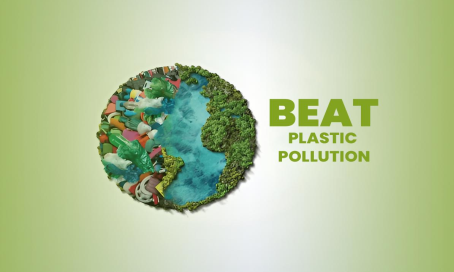Global Regulations and High Tech: A Dual Approach to Ending Plastic Pollution
August 16, 2025

The plastic pollution problem does not start in the middle of the ocean; [it] does not start on our shores or in our rivers: It starts on land. Solutions should be found on land, its source. By Merijn Tinga, Dutch environmental activist and Plastic Soup Surfer.
Details
Plastic pollution has escalated into a global crisis over the years. With over 400 million tons of plastic produced annually, much of which ends up polluting our oceans, landscapes, and food chains, is an alarming situation that needs immediate action. Addressing this pervasive issue requires a concerted effort combining robust global regulations and the strategic deployment of advanced technologies.
The Imperative for Global Regulations
Plastic waste transcends national borders, carried by ocean currents and international trade, making unilateral efforts insufficient. This is where global regulations are essential to establish a cohesive framework that ensures all nations adhere to consistent standards in plastic production, usage, and disposal.
The United Nations has initiated negotiations for a legally binding treaty aimed at ending plastic pollution by 2040. This treaty seeks to address the entire lifecycle of plastics, from production to disposal, including the marine environment. However, challenges persist, with disagreements over production limits and recycling-focused solutions, some fossil fuel-producing countries have resisted measures to limit new plastic production, advocating instead for enhanced recycling efforts creating a resistance to the targeted goals.
International agreements like the Basel Convention play a pivotal role in regulating the transboundary movement of plastic waste, preventing its dumping in developing countries. Such regulations will not only
mitigate environmental harm but also promote innovation by encouraging the development of sustainable alternatives and circular economy models. Such initiatives need a continuous push to get meaningful results for the whole ecosystem.
Harnessing Advanced Technologies
Another way to tackle this is the use of technology. The Fourth Industrial Revolution has ushered in technologies such as artificial intelligence, biotechnology, and blockchain that hold immense potential in combating plastic pollution. These technologies can revolutionize waste management by enabling smarter recycling processes, better material tracking, and the development of biodegradable alternatives .
Despite the promise, investment disparities hinder progress. Between 2018 and 2023, $190 billion was invested in circular plastic initiatives, yet only 6% reached emerging markets, which bear the brunt of plastic pollution. Moreover, preventive measures and digital waste management systems remain underfunded, limiting the scalability of innovative solutions.
For instance, companies like SAP are leveraging their software to help businesses manage material flows, including plastics, aligning upstream efforts with downstream solutions. By treating packaging data with the same scrutiny as financial information, businesses can optimize investments in recycling systems and comply with evolving regulations.
Voices from Global Leaders
Plastic pollution is no longer a looming threat. It’s a present and pervasive crisis affecting ecosystems, public health, and economies across the globe. From oceans teeming with waste to microplastics found in human bloodstreams, the scale of the problem demands urgent, unified action. World leaders and environmental champions are raising their voices, calling for systemic changes and bold policies to confront this mounting environmental emergency.
António Guterres, UN Secretary-General, underscored the gravity of the crisis:
"Plastic pollution is everywhere – all around us and even inside us – from our seas to our blood, to our brains. We are choking on plastic."
He highlighted the need for a comprehensive global treaty that ensures a just transition for all, particularly the 20 million waste pickers who form the backbone of informal waste management systems worldwide.
India’s Union Environment Minister, Bhupender Yadav, affirmed India’s commitment to sustainability:
"Continuously taking steps to promote use of eco-alternatives to single-use plastic items, India stands committed to ambitious climate action."
Echoing this on a local level, Maharashtra Chief Minister Devendra Fadnavis initiated a year-long campaign to eliminate single-use plastics, showcasing how local governance can lead the way in environmental reforms.
Maroš Šefčovič, Executive Vice President of the European Green Deal, issued a stark warning about the future:
"Plastics are choking our oceans, polluting the environment and harming people’s health and livelihoods. If business as usual continues, plastic production will triple by 2060."
These statements make one thing clear: plastic pollution is not a distant issue, it is here, now, and escalating. Global leaders must act decisively and collaboratively, not only to curb plastic production and waste, but to protect vulnerable communities and ecosystems. From international treaties to grassroots campaigns, the call to action is resounding. We must shift from rhetoric to results before the damage becomes irreversible.
A Collaborative Path Forward
Addressing plastic pollution necessitates a synergistic approach that combines stringent global regulations with the strategic application of advanced technologies. This dual strategy ensures a level playing field for businesses, fosters innovation, and promotes sustainable practices globally.
As the world moves towards finalizing the UN Plastics Treaty, it is imperative for nations to bridge their differences and commit to comprehensive solutions. Simultaneously, increased investment in emerging markets and underfunded technological areas is crucial to ensure equitable progress.
Every little bit helps; through unified global action and the harnessing of technological advancements we can hope to stem the tide of plastic pollution and safeguard our planet for future generations.
